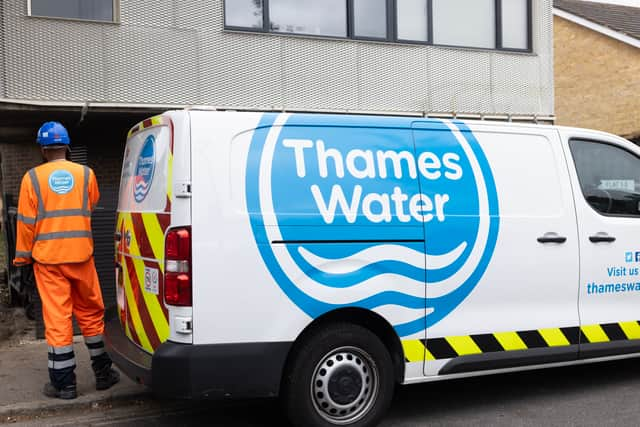Thames Water fails to meet targets on sewage leaks and blockages due to ‘ageing’ network and ‘extreme weather’
and live on Freeview channel 276
Thames Water has missed half of its performance targets on sewage leakages, pollution and blockages due to the “declining health” of its “ageing infrastructure”.
In the firm’s annual report for the 2022/23 it highlighted that it had missed its water leakage target, hitting 602.2 million litres a day based on a three-year rolling average.
Advertisement
Hide AdAdvertisement
Hide AdThe water company blamed “extreme weather” for having a major impact on its network as it “faced two weather events at opposite extremes in the space of months.”
Another missed target was its number of pollution incidents as the firm saw 331 occurrences last year when the target they are aiming to hit is 259.
It also missed its target for the number of blockages cleared. The water company said 80% of the blockages have been “caused by the wrong things being put down the drain, including fat, oils, greases and wet wipes.”
Thames Water chairman Ian Marchant said the “impact of climate change and population growth” has added “more pressure on the already stretched network” and it is “clear there needs to be urgent reform of the sector”.
Advertisement
Hide AdAdvertisement
Hide Ad

He said that Thames Water’s performance last year was “affected by a number of large asset failures on Thames’ ageing network, including a burst on a 100-year-old, 42-inch water main in Belsize Park and a burst pressurised sewer in Swindon that caused a serious pollution of the River Ray”.
He added that the “declining health of Thames Water’s ageing infrastructure is increasingly evident” and “the risks need to be at the top of the regulatory and political agenda”.
In a statement, Cathryn Ross and Alastair Cochran, interim co-chief executives of Thames Water, said the supplier had faced an “extremely challenging year” and “in short, our performance was not as we, or our customers, wanted it to be”.
They said that they both “care deeply about the health of our rivers” and have been “clear for years that untreated discharges into rivers are unacceptable”.
Advertisement
Hide AdAdvertisement
Hide AdDespite missed targets, Thames Water significantly reduced sewage discharges through its storm overflows by 46% compared with the previous year. It also met targets on areas such as acceptability to water customers, unplanned outages and sewer collapses.
Ms Ross and Mr Cochran pointed towards the dry weather last year as a factor in reducing the amount of sewage spills.
They said: “The weather helped us secure a huge reduction in sewage spills last year, with the exceptionally dry weather in the Summer, and we won’t be complacent.
“Our job is to deliver a good service, regardless of the weather. So the face that 2022 was a year of climate extremes is no excuse for poor performance.”
Advertisement
Hide AdAdvertisement
Hide AdThe firm missing half of its targets comes amid a time of uncertainty as it has been revealed that it has racked up a whopping £14 million debt pile.
Thames Water investors have agreed to provide £750 million in funds over the next 18 months after the company faced fears of collapse but it is less than the £1 billion it was hoping to secure.
The government has said it is ready to act in a worst case scenario if the company, which serves a quarter of the UK’s population, collapses.
The water company has also been criticised for “muddying” the waters by sewage campaigners as it hires the ex CEO of water regulator Ofwat.
Advertisement
Hide AdAdvertisement
Hide AdThames Water employed Cathryn Ross as the firm’s new interim joint chief executive after former CEO Sarah Bentley resigned.
Louise Reddy, Policy Officer at environment group Surfers Against Sewage, told NationalWorld: “We need a robust and challenging regulator to get us out of this mess. Not one that can’t draw the line between regulator and regulated.”
Comment Guidelines
National World encourages reader discussion on our stories. User feedback, insights and back-and-forth exchanges add a rich layer of context to reporting. Please review our Community Guidelines before commenting.
